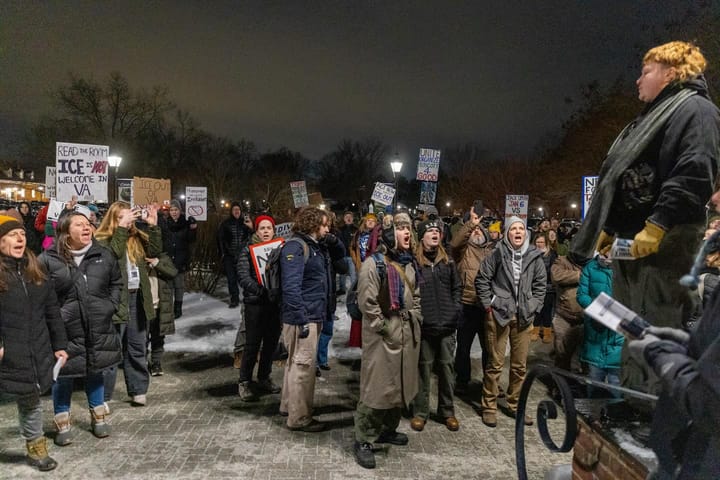
Parks department retools urban ranger role in light of January shooting
After the Jan. 19 shooting of a city park ranger on Belle Isle, Richmond’s Department of Parks and Recreation is revamping its urban park ranger role to move it further away from an enforcement role and back toward a more educational and visitor services focus.
“We got a little bit off track,” said Christopher Frelke, the department’s director. “And so the incident that happened made us all do a very big stop, reset and relook at what was the initial purpose, relook at some of these different pieces, and really go back to the principles.”
Police have released few details about what happened on Belle Isle on Jan. 19. An initial press release said an “unidentified male suspect” had shot the urban park ranger as the ranger “was providing information on available City of Richmond resources.” The suspect was said to be “a black male in his late 30’s, approximately 5’11 tall, with a short patchy beard, short unkept hair, wearing a black jacket, black pants, and gray or black boots.”
The ranger, whose identity has never been made public, was wearing his own bulletproof vest at the time of the shooting and did not sustain a serious injury. Richmond Police Department has provided no updates since.
Frelke and Giles Garrison, the maintenance and operations superintendent for the Parks Department who oversees the urban park ranger program, said the investigation has been solely in the hands of the police and neither have been questioned in relation to the incident.
But as RPD unravels the events surrounding the Jan. 19 shooting, Parks and Recreation began its own after-action assessment to determine what policies, procedures and equipment might be needed to ensure rangers remain safe.
That review did not produce a formal report, but Frelke said it involved numerous interviews with staff and Friends groups related to the parks system about what rangers were experiencing and how the program could work better.
Ultimately, the assessment led to a recommendation that Richmond’s park rangers no longer assume responsibility for enforcing park rules and instead focus on visitor engagement, youth programs, oversight of the permitting system for commercial park uses like rafting, and natural resource management planning. As part of that revamp, the park ranger program will merge with the James River Park System’s Outdoor Education program.
“When you look at the initial job description that we posted, this was more the gear of the job description, but we went way down into the enforcement,” said Frelke. “The immediate need sometimes takes you off focus on what the actual program is.”
Park ranger programs across the nation vary widely in their design. Those with a more enforcement-focused role tend to use sworn law enforcement officers as rangers, who have the ability to issue citations and sometimes are armed. Other approaches cast rangers in a primarily educational role in which they serve as guides for parks but don’t enforce rules or laws.
Richmond’s program, which was created in 2022, initially envisioned its rangers as falling into the second category, but the close proximity between the James River Park System and the city’s dense urban core quickly led to blurred lines. Rangers found themselves navigating not only illegal activities like spray-painting of rocks, setting of fires, running of dogs off leash and drug and alcohol use, but also interactions with homeless people who saw the parks as a place of shelter and could sometimes require considerable resources.
“We didn't have the ability to write tickets,” said Frelke, although he said the Parks Department had been working with the city attorney’s office to figure out a legal path for that to happen. In the meantime, “we were going out and talking to people that were breaking the rules.”
Without any enforcement power to back those warnings up, however, incidents weren’t declining and rangers were frequently facing aggressive pushback from members of the public angered by being told to leash their dog or move their illegally parked car, said the department. Frelke said some of the accounts he heard of interactions were “shocking” and in retrospect could be seen as “near misses” of serious violence.
“What we learned is that the more direct engagement you do, where you are directly enforcing the rules, the more training and protection people need,” said Garrison. “So we needed to look at the strategy again.”
Frelke said the department concluded that if the rangers were to have enforcement powers, they would need to be under the oversight of RPD.
Police in Richmond remain stretched thin, however, with more than 100 vacant positions and daunting caseloads. So the Parks Department decided to refocus on what it sees as its area of expertise: helping people navigate and appreciate the city’s extensive system, particularly as the city’s population continues to grow. Rules and law enforcement issues will be referred to police and Animal Control, although rangers can act as “eyes and ears” on the ground.
Frelke and Garrison said there has been no apparent decrease in visitors to the James River Parks System since the shooting; Belle Isle remains its most popular site. (“We get almost the population of Richmond there every summer, based on the data that we now have,” said Garrison.)
The combination of the revamped park ranger program with the JRPS outdoor education role will also mean increased staffing. Prior to the shooting, the city had budgeted for five rangers, and two had been hired, although the ranger who was shot has since left his role. The new vision for the program would allow six full-time rangers, and officials say their redefined role could help bring in even more visitors to the parks.
“That's a really positive outcome of this soul-searching moment that we've had, actually,” said Garrison. “I think it's going to strengthen the existing outdoor education program and strengthen and improve and focus the park ranger program.”
Contact Reporter Sarah Vogelsong at svogelsong@richmonder.org
The Richmonder is powered by your donations. For just $9.99 a month, you can join the 1,000+ donors who are keeping quality local journalism alive in Richmond.






